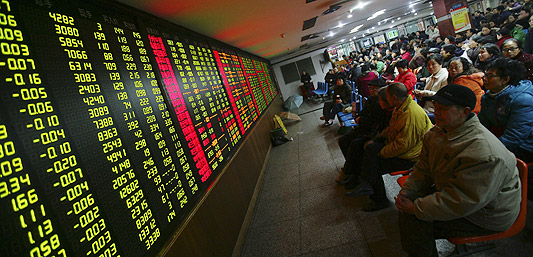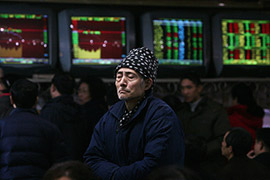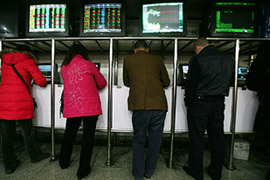China’s Wild East stock market
Large numbers of novice investors make for a rollercoaster ride.

 |
| A growing number of Chinese have cash to invest but little market know-how [GALLO/GETTY] |
When US markets plunge, international investors always look at what ripple effects there might be in Europe and Asia.
Keep reading
list of 4 itemsEcuador weighs security, international arbitration in latest referendum
‘Triple spending’: Zimbabweans bear cost of changing to new ZiG currency
Boeing hit with 32 whistleblower claims, as dead worker’s case reviewed
For decades the focus in Asia has been on Tokyo and Hong Kong. But more and more often investors also want to know how the mainland Chinese stock markets are reacting.
The Shanghai Stock Exchange, China‘s biggest, has only been around since 1990. It is very young, and very much the new kid on the block.
And, like many teenagers, it is much is more volatile than other more established global stock exchanges.
Excited Chinese from the country’s emerging new middle class – people who have never experienced investing in stocks – dive in with little understanding of how trading works, approach the market the way many approach playing roulette.
Many gather in halls with electronic boards running the latest stock prices.
 |
| Trading halls have sprung up across China [GALLO/GETTY] |
The crowds that gather there tend to be older Chinese who don’t know how to use the internet but who want to bet their money on newly-listed companies.
There are thousands of such halls across China – forums where novice investors can trade tips, gossip and soak up the atmosphere.
Many newcomers to the Chinese stock market experience their first purchase at halls like these.
In one hall in Shanghai a novice trader we spoke to admitted she was a little confused about the red and green numbers displayed on the boards.
“They’ve been negative for the past couple of days, and I’m here to see whether things are in the positive,” she said.
“I’ll be so happy but actually I don’t really know what I’m doing!”
Others use the halls as a place to while away the day, staring at the boards.
Another player among China‘s new generation of day-traders that we spoke to was actually reading a dictionary. He took a philosophical attitude to his investments.
“I think this is all perfectly normal; for the numbers to go up and down,” he said.
“You can’t have your highs without having those lows.”
 |
| Many investors approach investing like any other game [GALLO/GETTY] |
With such a crowd driving the stock market, it would not be an exaggeration to say that many people have lost huge amounts of money playing the Chinese stock markets.
Zennon Kapron, director of consultancy Kapronasia, says that in China individual investors drive the market’s daily twist and turns much more than they would in other stock markets.
“The market is really driven by the thoughts of the people themselves,” he says.
That is largely because the government limits the number of institutional investors – meaning banks, mutual funds, insurance companies and the like – from investing in the Chinese markets.
“If you take a look at the Shanghai market versus the New York or Hong Kong markets, typically what keeps those markets more stable is a strong institutional base,” Kapron says.
“So in New York, it’s about 20 per cent retail investors, 80 per cent institutional. So you have a bit of stability in the market.”
In China though, and Shanghai in particular, stock market investments are about 60 per cent retail – still very high compared to other more developed markets, but well down from the 90 per cent level it was at about five years ago.
 |
| Until recently few investors focused on events in the rest of the world [GALLO/GETTY] |
Another difference among Chinese investors is that most buy into specific stocks, looking at a specific company’s performance and make their buying and selling decisions accordingly.
What that means, analysts say, is that the Chinese tend not to focus on what is happening in the US and the rest of the world, seeing less of a connection with how other markets and economies are performing and the value of their individual stocks.
“Investors don’t know that much about the economy as a whole,” Kapron says.
“But when they’re looking at individual stocks, they’re making decisions on very sound fundamentals.”
Recent evidence shows that Chinese stocks cannot completely avoid the kind of turmoil that has hit the rest of the world. But, but for now at least, most of China‘s new generation of day traders seem undeterred.
They have seen China‘s economy grow by the double digits over the past few years and have yet to experience a serious, long-term downswing
Ask anyone in one of China‘s countless trading halls whether they will continue to invest, and almost all say they will go on dropping money into their stocks.